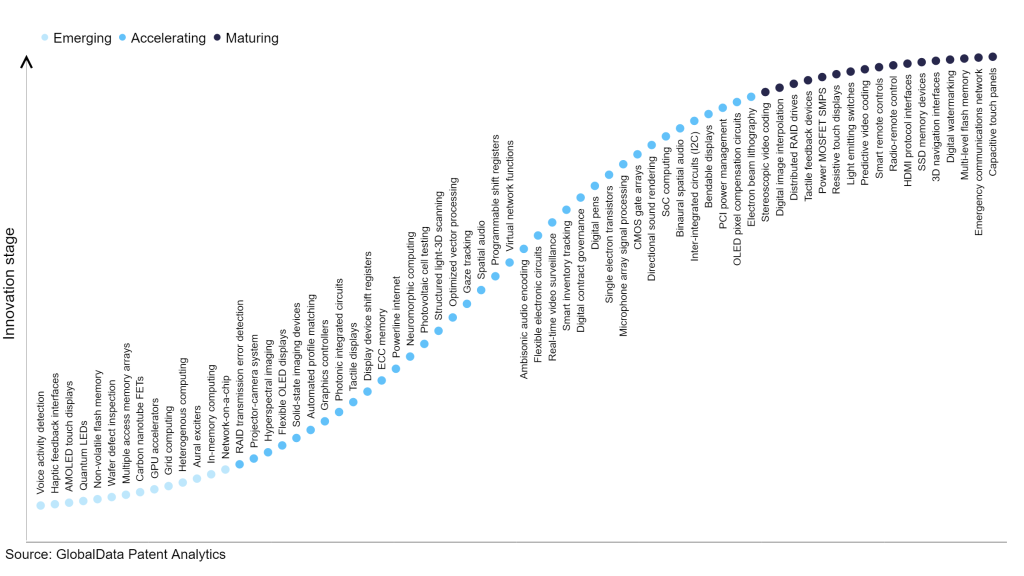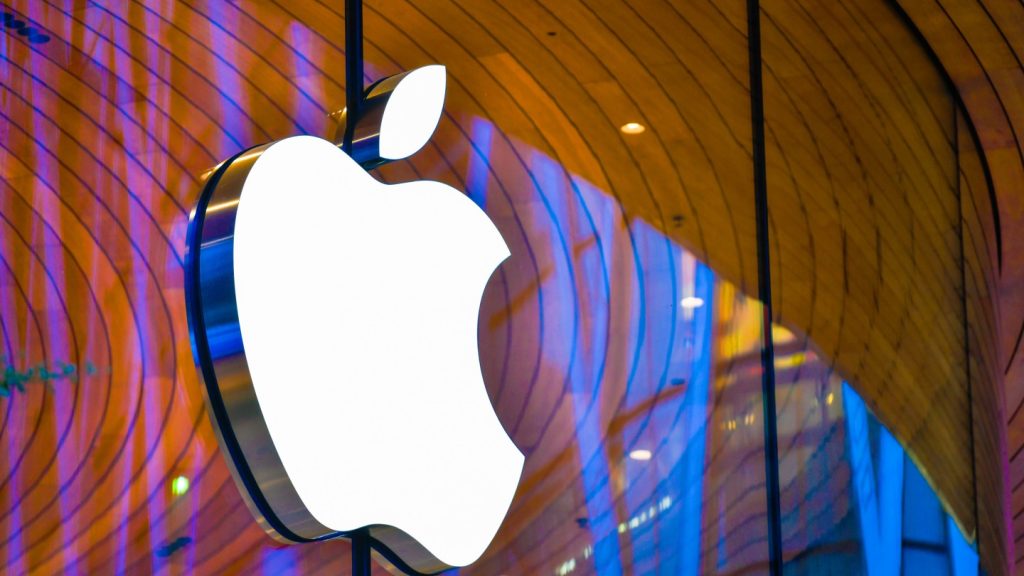The technology industry continues to be a hotbed of patent innovation. Activity is driven by the escalating demand for accelerated computing power, driven by advancements in AI and data-intensive applications, the expansion of cloud computing and the need for efficient data processing contribute to the increasing adoption of GPU accelerators. The growing importance of technologies such as GPU architectures, specialized libraries and frameworks for GPU computing, further fuel the demand for GPU accelerators. In the last three years alone, there have been over 4.1 million patents filed and granted in the technology industry, according to GlobalData’s report on Innovation in technology: GPU accelerators. Buy the report here.
However, not all innovations are equal and nor do they follow a constant upward trend. Instead, their evolution takes the form of an S-shaped curve that reflects their typical lifecycle from early emergence to accelerating adoption, before finally stabilizing and reaching maturity.
Identifying where a particular innovation is on this journey, especially those that are in the emerging and accelerating stages, is essential for understanding their current level of adoption and the likely future trajectory and impact they will have.
190+ innovations will shape the technology industry
According to GlobalData’s Technology Foresights, which plots the S-curve for the technology industry using innovation intensity models built on over 1.5 million patents, there are 190+ innovation areas that will shape the future of the industry.
Within the emerging innovation stage, network-on-a-chip, in-memory computing, and aural exciters are disruptive technologies that are in the early stages of application and should be tracked closely. Electron beam lithography, OLED pixel compensation circuits, and PCI power management are some of the accelerating innovation areas, where adoption has been steadily increasing. Among maturing innovation areas are capacitive touch panels and emergency communications network, which are now well established in the industry.
Innovation S-curve for the technology industry

GPU accelerators is a key innovation area in technology
GPU accelerators are dedicated hardware units crafted to swiftly handle and manipulate vast volumes of data simultaneously through numerous small computing cores. They are tailored for compute-intensive tasks demanding both swift memory access with low latency and high data throughput. This specialized hardware significantly boosts the execution of intricate, computationally intensive algorithms.
GlobalData’s analysis also uncovers the companies at the forefront of each innovation area and assesses the potential reach and impact of their patenting activity across different applications and geographies. According to GlobalData, there are 180+ companies, spanning technology vendors, established technology companies, and up-and-coming start-ups engaged in the development and application of GPU accelerators.
Key players in GPU accelerators – a disruptive innovation in the technology industry
‘Application diversity’ measures the number of applications identified for each patent. It broadly splits companies into either ‘niche’ or ‘diversified’ innovators.
‘Geographic reach’ refers to the number of countries each patent is registered in. It reflects the breadth of geographic application intended, ranging from ‘global’ to ‘local’.
Patent volumes related to GPU accelerators
| Company | Total patents (2010 - 2022) | Premium intelligence on the world's largest companies |
| Tencent Technology (Shenzhen) | 14 | Unlock Company Profile |
| Nvidia | 22 | Unlock Company Profile |
| LG Electronics | 9 | Unlock Company Profile |
| SK Hynix | 24 | Unlock Company Profile |
| Samsung Electronics | 190 | Unlock Company Profile |
| ARM | 9 | Unlock Company Profile |
| Robert Bosch | 13 | Unlock Company Profile |
| Amazon Technologies | 15 | Unlock Company Profile |
| Hewlett-Packard Development | 7 | Unlock Company Profile |
| Xilinx | 16 | Unlock Company Profile |
| Home Box Office | 22 | Unlock Company Profile |
| Huawei Technologies | 16 | Unlock Company Profile |
| 92 | Unlock Company Profile | |
| Hewlett Packard Enterprise Development | 7 | Unlock Company Profile |
| Western Digital Technologies | 9 | Unlock Company Profile |
| Beijing Baidu Netcom Science Technology | 22 | Unlock Company Profile |
| HRL Laboratories | 6 | Unlock Company Profile |
| Movidius | 14 | Unlock Company Profile |
| Microsoft Technology Licensing | 116 | Unlock Company Profile |
| Imagination Technologies | 19 | Unlock Company Profile |
| Motion Metrics International | 7 | Unlock Company Profile |
| Micron Technology | 59 | Unlock Company Profile |
| Qualcomm | 29 | Unlock Company Profile |
| Texas Instruments | 9 | Unlock Company Profile |
| Apple | 6 | Unlock Company Profile |
| Alibaba Group | 11 | Unlock Company Profile |
| Meta Platforms | 14 | Unlock Company Profile |
| Renesas Electronics | 8 | Unlock Company Profile |
| Advanced Micro Devices | 24 | Unlock Company Profile |
| Mazda Motor | 7 | Unlock Company Profile |
| Canon | 13 | Unlock Company Profile |
| Tencent | 15 | Unlock Company Profile |
| NVIDIA | 35 | Unlock Company Profile |
| IBM | 15 | Unlock Company Profile |
| Macronix International | 8 | Unlock Company Profile |
| Toshiba | 8 | Unlock Company Profile |
| Intel | 440 | Unlock Company Profile |
| Snap | 11 | Unlock Company Profile |
| Pure Storage | 20 | Unlock Company Profile |
| Micron Technology | 64 | Unlock Company Profile |
| Atomwise | 8 | Unlock Company Profile |
| SZ DJI Technology | 8 | Unlock Company Profile |
| Cambricon Technologies | 16 | Unlock Company Profile |
| Another Brain | 8 | Unlock Company Profile |
| SambaNova Systems | 9 | Unlock Company Profile |
| Wave Computing | 6 | Unlock Company Profile |
| Hailo | 23 | Unlock Company Profile |
| IntelliFusion | 7 | Unlock Company Profile |
| Via Alliance Semiconductor | 9 | Unlock Company Profile |
| Shanghai Cambricon Information Technology | 48 | Unlock Company Profile |
Source: GlobalData Patent Analytics
Among the companies innovating in GPU accelerators, Alphabet is one of the leading patents filers. The company’s patents are aimed at describing a method that involves the execution of a convolutional neural network layer on an image processor equipped with an array of execution lanes and a two-dimensional shift register. This execution process encompasses loading a plane of image data from a three-dimensional block into the two-dimensional shift register. Additionally, it includes carrying out a two-dimensional convolution by sequentially: simultaneously multiplying pixel and coefficient values within the execution lanes to generate an array of partial products; concurrently summing the partial products within the execution lanes, with accumulations of partial products stored in the two-dimensional register for distinct stencils within the image data; and aligning values for the two-dimensional convolution within the execution lanes by shifting content within the two-dimensional shift register array. Other prominent patent filers in the space include Intel and Samsung.
In terms of application diversity, AT&T leads the pack, while Texas Instruments and Toshiba stood in second and third positions, respectively. By means of geographic reach, Hailo held the top position, followed by Microsoft and AT&T.
GPU accelerators excel at parallel processing, making them vital for tasks like AI, deep learning, scientific simulations, and high-performance computing. Their ability to handle multiple parallelizable tasks simultaneously vastly speeds up complex computations. This is particularly crucial in fields where massive datasets and intricate algorithms are prevalent. The integration of GPU accelerators has revolutionized industries ranging from healthcare to finance, enabling them to process and analyze data at unprecedented speeds, ultimately driving innovation and progress in various domains.
To further understand the key themes and technologies disrupting the technology industry, access GlobalData’s latest thematic research report on Technology.
Data Insights
From

The gold standard of business intelligence.
Blending expert knowledge with cutting-edge technology, GlobalData’s unrivalled proprietary data will enable you to decode what’s happening in your market. You can make better informed decisions and gain a future-proof advantage over your competitors.







